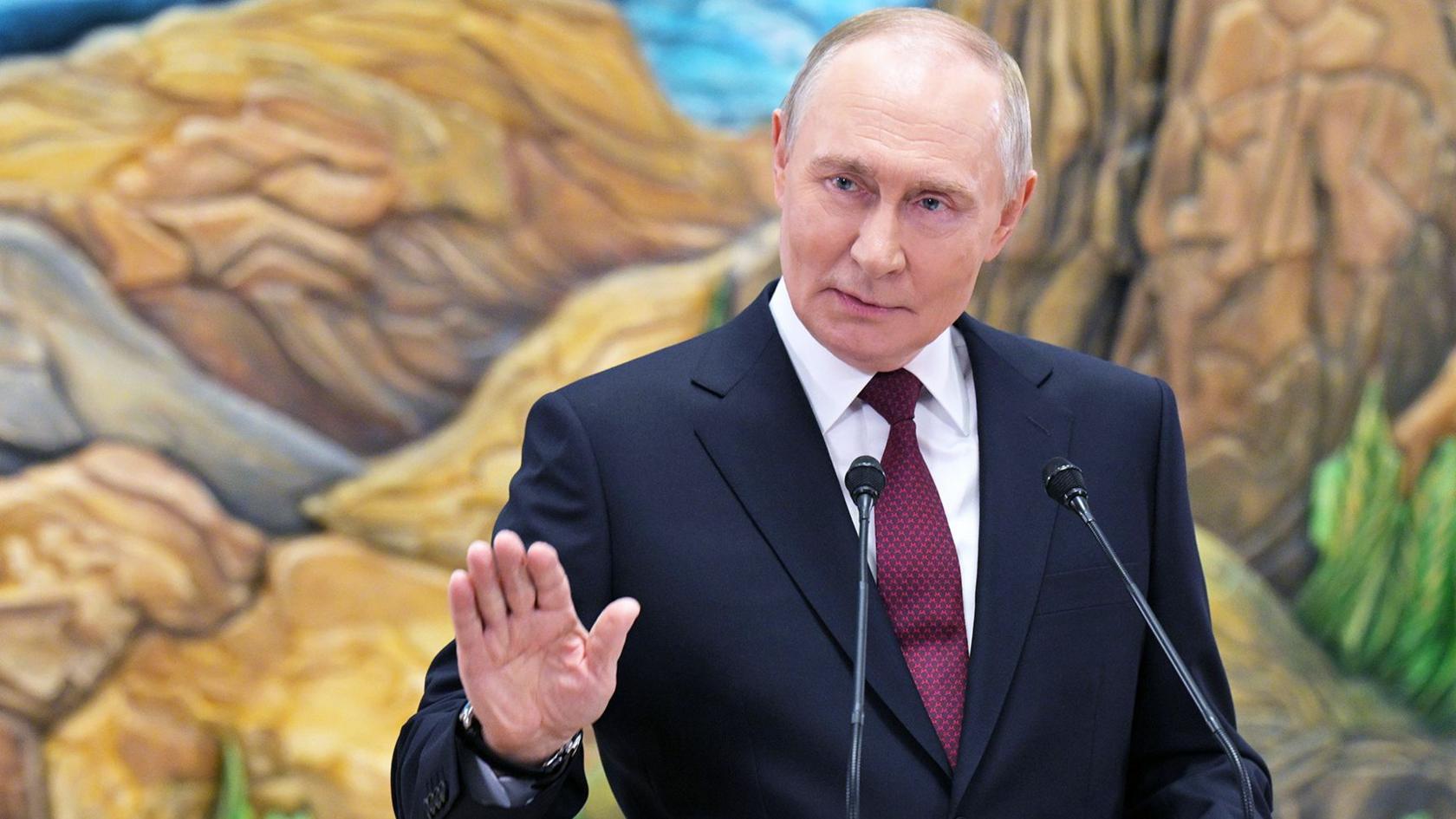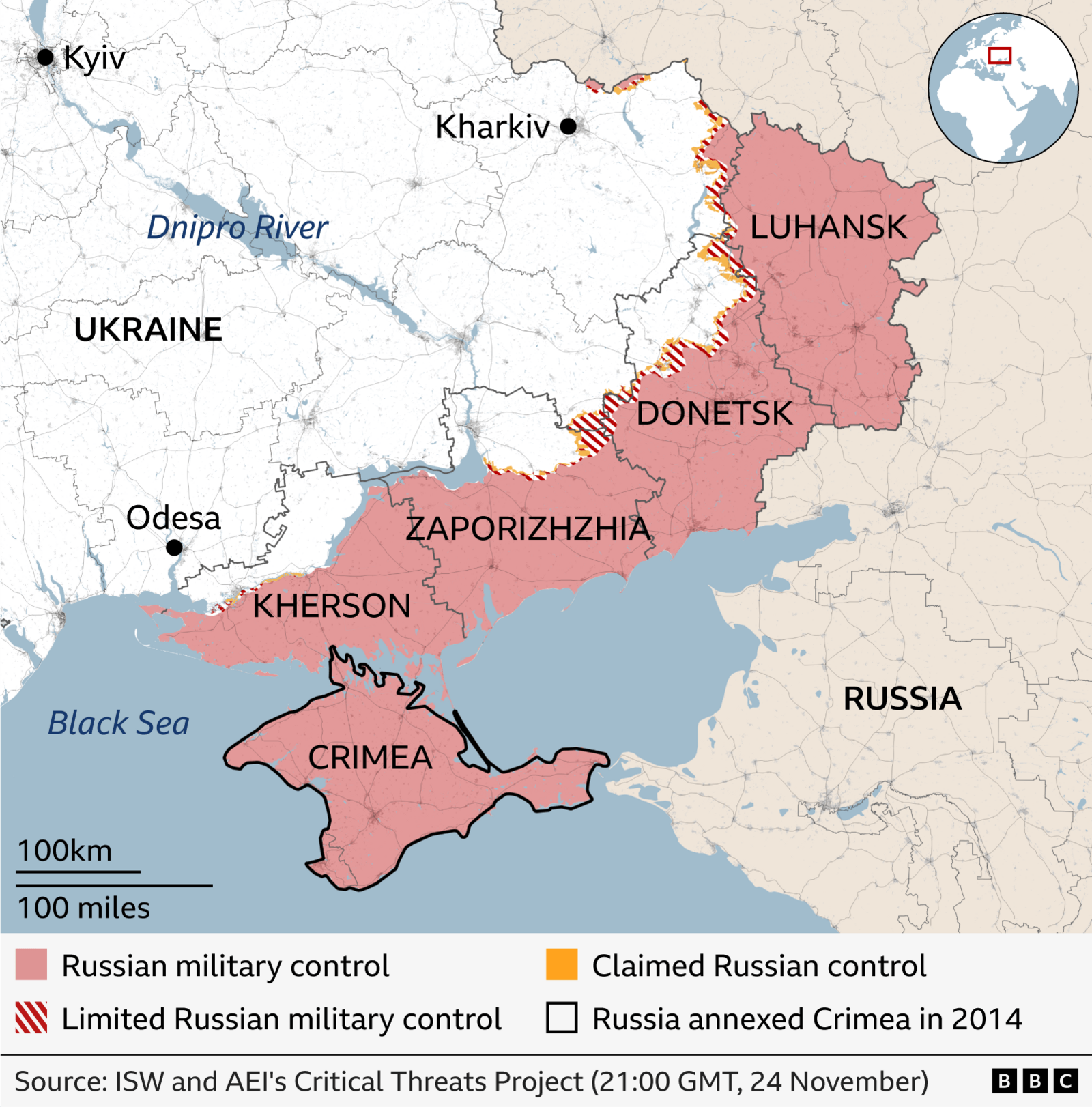Putin doubles down on demands for Ukrainian territory ahead of talks with US in Moscow

Russia will lay down arms only if Kyiv's troops withdraw from territory claimed by Moscow, Putin said
- Published
President Vladimir Putin has doubled down on his core demands for ending the war in Ukraine, stating that Russia will lay down arms only if Kyiv's troops withdraw from territory claimed by Moscow.
Putin has long pushed for legal recognition of the Ukrainian territories Russia has seized by force.
They include the Crimean peninsula, which it illegally annexed in 2014, and the Donbas, made up of Luhansk and Donetsk, which Moscow now occupies for the most part.
For Kyiv, which has ruled out relinquishing the parts of the Donbas it still holds, rewarding Russia for its aggression is a non-starter.
Speaking to reporters during a trip to Kyrgyzstan, Putin accused Kyiv of wanting to fight "to the last Ukrainian" - which he said Russia was "in principle" also ready to do.
He repeated his view that Russia has the initiative on the battlefield and the fighting would only end when Ukrainian troops withdrew from the embattled territories.
"If they don't withdraw, we'll achieve this by force of arms," he said.
Yet Russia's slow gains in eastern Ukraine have come at significant cost of manpower. According to the US-based Institute for the Study of War, at this rate it would take Moscow almost two more years to seize the rest of the Donetsk region.
Thursday's remarks were the first time that Putin addressed the hectic diplomatic moves of the last week, which saw the US and Ukraine hold intense discussions over a peace plan reportedly drafted in October by American and Russian officials.
The plan, which was heavily slanted towards Moscow's demands, was subsequently revised. However, it is thought it does not address the issue of the occupied territories which - alongside security guarantees for Ukraine - is the biggest sticking point between Moscow and Kyiv.
Putin said that new draft plan has now been shown to Russia, and that it could become the "basis" for a future agreement to end the war.
However, he added it was "absolutely necessary" to discuss "certain specific points that need to be put in diplomatic language".
Asked about the possibility of Crimea and the Donbas being recognised as under Russian de facto control but not legally, Putin said: "This is the point of our discussion with our American counterparts".
A US delegation including special envoy Steve Witkoff was expected in Moscow in the first half of next week, he confirmed. US President Donald Trump told reporters that Witkoff may be joined in Moscow by the president's son-in-law Jared Kushner.
Meanwhile, Ukraine's top presidential aide Andriy Yermak said that US Army Secretary Dan Driscoll is due to visit Kyiv later in the week.
On Wednesday Trump said there were "only a few remaining points of disagreement" between Russia and Ukraine – indicating that any meeting with Ukraine's President Volodymyr Zelensky to discuss these points was contingent on a peace deal being agreed upon.
During his comments to reporters Putin again expressed his contempt for the Ukrainian leadership, which he said he considered illegitimate. There was therefore "no use" signing any documents with them, he added.
Ukraine has been under martial law since the start of Russia's full-scale invasion in February 2022 and has therefore been unable to hold scheduled elections. Earlier this year, the Ukrainian parliament voted unanimously to affirm the legitimacy of President Zelensky, whose term in office ended in the spring.
Putin also dismissed warnings by European leaders that Russia could attack the European continent within the next decades.
"That sounds laughable to us, really," he said.
The White House and Donald Trump have sounded optimistic about the recent diplomatic push for peace talks, but Europeans have repeatedly expressed their scepticism over whether Putin truly intended to end the war.
On Wednesday European Commission chief Ursula von der Leyen accused Russia of upholding a post-World War Two mindset and of seeing the European continent as a "sphere of influence" in which sovereign nations could be "carved up".
